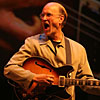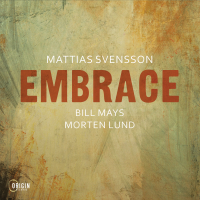Home » Jazz Articles » Jazz and the Net » Sonny Rollins is My Rabbi
Sonny Rollins is My Rabbi
...For me, Sonny is like the Dalai Lama, or Gandhi. He possesses an angelic quality that's rare...
Over the years, I'd heard his music, both on recordings, and some remarkable performances. I'd also read all about this fellow and the more dramatic episodes of his life. Although he had a reputation as being a "heavy cat, I wasn't intimidated at the prospect of meeting him.
But after his wife Lucille picked me up at the train station and opened the door of their simple but cozy home, I looked up the stairs and saw a man who appeared to be about eight feet tall.
We exchanged greetings, and I immediately set up my recorder to begin. He was quiet initially, friendly with little small talk. I had my questions, and he had his answers, but they didn't come easily. After I asked the first question, he paused. After the second question, a longer pause. After the third, even longer.
I couldn't read his mind, but I could feel him working it out, like he does his improvisations. Here was a thoughtful, deep thinking individual obviously quite intelligent and self-aware.
At the same time, there was his presence, his powerful life force, the same one that you feel when hearing him in person. The same one that you can feel when plays. There's a lot of energy coming through that horn, enough to warm a frigid apartment on a cold winter's day.
Some say that one's life force is a manifestation of a greater source, and in Sonny's case, I'd say he is connected to the universe in a way that few people ever experience. It is written that this connection to things more profound is natural for some people, and for others, it comes through meditation or prayer. It's almost like he's hooked up to a higher power, a deeper vibration.
I suspect Sonny was born this way, but he's also a man seeking a deeper meaning to life, and so he's done a considerable amount of work on himself over the years. His music is a meditation, and he's also practiced yoga for decades and spent time in an Indian Ashram.
So those long pauses were actually a blessing, because they gave me a chance just to "be with Sonny. It's one thing to sit and talk, and it's another to sit in his living room, while he's thinking. Those were some powerful first impressions of this man.
The interview, which I have in a back issue somewhere, concluded, and then I joined Sonny and Lucille in their kitchen for some lunch. Immediately, I felt completely at home, like I'd known them all my life. This man whose artistry has been celebrated globally for over half a century, had Buddha like humility, yet the fire was present, and he was obviously dedicated to his music. After lunch, he took me outside to his studio, the place he practiced, Sonny's woodshed. He spent a lot of time in that room.
A few hours later I was back in Manhattan. And so began a unique friendship that endures. Over the years, Sonny has become a spiritual mentor to me. There have been many discussions about the big questions, the ones we can never answer. We are both quite opinionated, and concerned, about the issues of our era. And we also share an apprecation of the lighter side. A conversation with Sonny can easily go from Noam Chomsky to Myron Cohen.
To me, Sonny is like the Dalai Lama, or Gandhi. He possesses an angelic quality that's rare in an era where ego and greed reign supreme. I'm not what you'd call religious but I'm a Jew in heritage, so when I think of Sonny Rollins as my Rabbi, it is because he is the spiritual leader of our Jazz community, an esteemed scholar and teacher qualified to expound on matters of a spiritual nature, both in his words, and actions.
In this case, it's about Sonny's music, and what that does for this planet and its inhabitants, and it's about Sonny, the man, and how he lives his life. Those are the lessons he offers.
Most of my heroes are long gone, and there are but a few mentors still extant in this new millenium. So I am blessed to have this remarkable individual in my life, a source of guidance, inspiration and truth.
I did an audio interview with Sonny a couple of weeks ago, on the eve of his 75th birthday, where he spoke, at length, about his philosophy of life, his feelings about Jazz and the media, 911, and future of humankind. That interview, in its entirety, will appear on his website, starting next month.
I edited excerpts from the interview, together with some clips from his new CD, Without A Song; the 9/11 Concert, to create the first All About Jazz Podcast.
When I got the call to do Sonny's website, I realized it was a project of unique importance. Knowing this man, and having received so much from him over the years, put this on a different plane than any other project in my creative portfolio.
I am not alone.
Nearly everyone who has heard his music, seen him live, or met him, has been touched by Sonny Rollins. Yet until this website, aside from chance meetings and fan mail, few people have had the opportunity to let him know just how meaningful his music has been for so many people on this planet.
So I recognized that the Guestbook would be a key component. Obviously, he wouldn't be able to answer each response individually, but he could read every one, and comment when possible.
In addition to giving everyone the opportunity to reach out and touch Sonny on the web, the Guestbook serves another function. On his website, aside from the interview I've mentioned, my goal was to have other people tell Sonny's story. "I don't want to sound like I'm blowing my own horn, Bret, he told me when we first got started. So at this point, there's no biography on the site. Instead, Sonny's life is documented through the entries in the Guestbook, and on the Reflections page, where bandmates, friends and disciples, offer their audio perspectives.
I also put up a videoclip of Sonny playing "Don't Stop the Carnival. It's brief, but memorable, capturing the essence of his music, and includes his nephew Clifton Anderson, the trombonist, who along with Terri Hinte, provided considerable assistance in the creation of the site. So in addition to words, both spoken and written, there is video and audio on the site, to share Sonny's legacy, and introduce his contributions to new listeners.
It's been a difficult twelve months for Sonny. He lost his wife of nearly fifty years, Lucille, a wonderful woman who took care of him, and his business. He also lost his dog, a close and trusted friend. Four years ago, he experienced 9/11 directly, his New York apartment but a few blocks away from the World Trade Center. After he evacuated, with just his horn, he eventually had to give up the apartment because of the smoke damage, losing his piano, music and prized books.
Yet his spirit is undiminished, the powerful essence of his creativity, still strong.
A few years ago, I wrote a Bio of Sonny for one of his CDs and those words still apply:
When Sonny Rollins picks up the tenor saxophone, the world listens. For nearly half a century, he has played music with the majesty of a Greek god, and today remains one of the few surviving icons from a golden era of jazz that will probably never be equaled.
Uncompromising and constantly searching, Rollins chooses to "live lightly on the planet. At the core of his humble lifestyle is a demanding practice regime, essential because of the tremendous demands he places on himself. And rather than exploit his lofty standing in the world of jazz, he chooses his creative venues prudently, working only when he chooses and recording sporadically. Consequently, every Rollins live appearance and new recording which documents his august creativity is like a rare gem, to be admired and studied.
Tags
PREVIOUS / NEXT
Support All About Jazz
 All About Jazz has been a pillar of jazz since 1995, championing it as an art form and, more importantly, supporting the musicians who make it. Our enduring commitment has made "AAJ" one of the most culturally important websites of its kind, read by hundreds of thousands of fans, musicians and industry figures every month.
All About Jazz has been a pillar of jazz since 1995, championing it as an art form and, more importantly, supporting the musicians who make it. Our enduring commitment has made "AAJ" one of the most culturally important websites of its kind, read by hundreds of thousands of fans, musicians and industry figures every month.
























